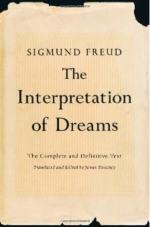
|
| Name: _________________________ | Period: ___________________ |
This test consists of 15 multiple choice questions and 5 short answer questions.
Multiple Choice Questions
1. Freud ends the section with proverbs about what __________ dream of.
(a) plants
(b) deities
(c) animals
(d) rocks
2. The dream is a tool of _______________.
(a) wish fulfillment
(b) understanding
(c) escapism
(d) learning
3. By taking the time to consider the answer to #56, this allows for ___________ the first interpretation.
(a) uncovering
(b) mastering
(c) listening to
(d) ignoring
4. According to Schleiermacher's theory, when we are away, we experience brain activity through ______.
(a) ideas
(b) images
(c) words
(d) concepts
5. Freud gives a ___________ background of the dream as it was regarded.
(a) argumentative
(b) simple
(c) historical
(d) daring
6. Included in the importance of forgetting dream matter is how __________________ a dream is.
(a) ordered or disordered
(b) dark or light
(c) simple or difficult
(d) light or heavy
7. The interpretation of dreams begins with the _________ content of the dream.
(a) thought
(b) obvious
(c) visual
(d) internal
8. Freud does not say there is only one kind of dream as this theory would be easily _________.
(a) refuted
(b) identified
(c) agreed with
(d) understood
9. Whose poetry does Freud cite as evidence of his own dream manifestations?
(a) Lucretius
(b) Dickinson
(c) Frost
(d) Shakespeare
10. Who thinks dreams with moral issues are actually the responsibility of the dreamer?
(a) Ferrer
(b) Freud
(c) Hillebrandt
(d) Jung
11. The answer to #92, these may or may not be ___________ during waking hours.
(a) obvious
(b) ordinary
(c) available
(d) realistic
12. What tends to appear in dreams?
(a) Childhood memories
(b) Calculations
(c) People we love
(d) Words
13. Whose dream theories does Freud agree with in this section?
(a) Carrient
(b) R.A. Scherner
(c) No one's
(d) Hillebrandt
14. Freud hopes he will be able to _______ the dream process.
(a) argue
(b) discover
(c) clarify
(d) identify
15. Freud says that the doctrine is not based on an interpretation of the obvious _______ of dream content.
(a) symbols
(b) memories
(c) background
(d) parts
Short Answer Questions
1. Freud does not believe one set of _________ applies to everyone.
2. The value of the dream is not like a _______________ being banged upon.
3. Freud notes that the world only has __________ limited methods for dream interpretation, both of which are worthless according to him.
4. Freud breaks down the __________ of memory with respect to dreams.
5. Dreams we forget are due to what?
|
This section contains 341 words (approx. 2 pages at 300 words per page) |

|




